Product Resources
Product Resources
HPLC columns
Agilent Technologies' Bio-Monolith HPLC columns are designed for high resolution, rapid separations of large proteins, antibodies, plasmid DNA, viruses, and other macro biomolecules. The columns contain a short, polymer-based monolith disk that reportedly allows for flow-rate independent separations. Strong cation exchange, strong and weak anion exchange, and protein A phases are available. Agilent Technologies, Inc., Santa Clara, CA;
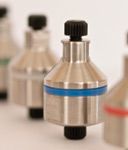
SPE products
The SampliQ SPE solid-phase extraction products from Agilent Technologies are designed for fast purification of extracts to improve the accuracy and reproducibility of analytical results. The products include polymer, silica, carbon, and Florisil PR sorbents in formats ranging from cartridges to 96-well plates. Agilent Technologies, Inc., Santa Clara, CA;
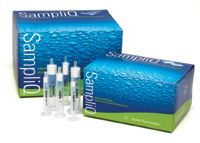
Proteomic analysis software
ProteoIQ software from BioInquire provides support for proteomic data analysis from statistical validation to quantification. According to the company, the software can be used for comparative proteomic analyses in which spectral counting-based quantification is combined with data mining functions to find differences between multiple proteomic data sets. BioInquire, Athens, GA;

Nano-LC system
Eksigent's NanoLC-Ultra high-pressure nano-LC system is designed for high-resolution separation of low-abundance peptides and proteins in proteomics applications. The system reportedly provides precise gradients at pressures as high as 10,000 psi. Eksigent Technologies, Inc., Dublin, CA;

Ion sources
Prosolia's Omni SprayR ion sources use the desorption electrospray ionization method. The sources are designed to allow for direct and rapid sampling and imaging of surfaces with minimal or no sample preparation. Prosolia, Indianapolis, IN;
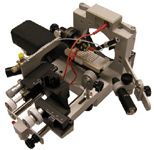
Mass spectrometer
The AXIMA Performance mass spectrometer from Shimadzu is designed to analyze high-mass species. In reflectron mode, the instrument reportedly generates high-resolution MS data for peptide mass fingerprinting and complex mixture analysis. Other features include full automation, calibration algorithms, data-dependent workflows, and application software. Shimadzu Scientific Instruments, Columbia, MD;

Proteomics equipment and software
Proteome Dynamics proteomics equipment and software from Thermo Fisher Scientific is designed for the identification, quantitation, and characterization of proteins. The Automated Phosphopeptide Workflow includes a phosphopeptide enrichment kit, a magnetic bead purification system, and a hybrid mass spectrometer. Software includes SIEVE 1.2, for label-free differential analysis, and ProSightPC 2.0, for identifying and characterizing proteins in tandem MS experiments. Thermo Fisher Scientific, San Jose, CA;
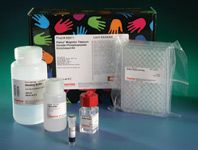
Mass spectrometer
The AB SCIEX QTRAP 5500 mass spectrometer from Applied Biosystems/MDS Analytical Technologies reportedly integrates triple-quadrupole capabilities with a linear accelerator ion trap for quantitative and qualitative analysis. According to the company, the system supports multiple experiments on the same instrument using a feature that allows scientists to move from triple-quadrupole scan modes to full-scan ion-trap mode in less than 1 ms. Applied Biosystems, Foster City, CA;
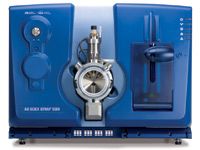
Mass spectrometer
The maXis mass spectrometer from Bruker Daltonics is designed for high-speed chromatography, small-molecule identification, trace analysis, metabolomics, and quantitative proteomics applications. According to the company, the instrument provides resolution in excess of 40,000 FWHM and mass accuracy of 600–800 ppb at speeds of up to 20 full spectra/s in both MS and MS-MS modes. Bruker Daltonics, Billerica, MA;
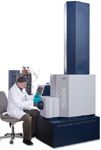
MS system
The Waters Xevo TQ MS system is a tandem quadrupole mass spectrometer designed for high sensitivity, selectivity, robustness, speed, and accuracy in HPLC– and UHPLC–MS-MS methods. According to the company, the system's collision cell provides enhanced LC–MS-MS data acquisition capabilities. Applications include quantitative and qualitative bioanalysis, ADME screening, food safety, environmental monitoring, and forensics. Waters Corporation, Milford, MA;
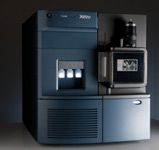
Instrument control software
ACQUITY UPLC v 1.31 instrument control software from Waters is designed for operational integration and connectivity between the company's ACQUITY UPLC system and ABI/MDS SCIEX mass spectrometers on Analyst and Analyst QS MS software. According to the company, the software promotes source efficiencies and improvements in MS sensitivity and spectral quality. Waters Corporation, Milford, MA;
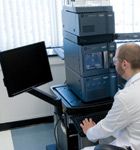
Ion mobility spectrometer
The TSI 3980C MacroIMS ion mobility spectrometer is designed for fast separation of macromoles. According to the company, the instrument's software allows overlay of spectra, raw data smoothing, and molecular weight–based controls and statistics. TSI Incorporated, Shoreview, MN;
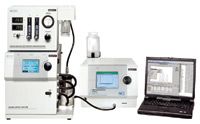
Water isotope analyzer
Picarro's model L1102-I water isotope analyzer is designed for simultaneous measurement of D/H and 18 O/16 O isotopic ratios. According to the company, the analyzer provides precision of less than 0.1% for δ 18 O and less than 0.5% for δD. The analyzer reportedly is fully automated and is not susceptible to drift. Picarro, Sunnyvale, CA;
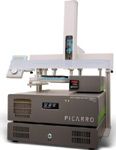
SPME syringe
The CUSTODION solid-phase microextraction (SPME) syringe from Torion Technologies is designed to sample analytes in air, water, or dissolved solids. According to the company, target analytes are quickly trapped onto the syringe's SPME fiber and can be analyzed on any SPME-compatible GC or GC–MS system. Torion Technologies Inc., American Fork, UT;

Electron multipliers
Channel and microchannel plate electron multipliers from PHOTONIS are designed to operate at pressures as high as 20 millitorr with high gain and low noise. According to the company, the electron multipliers can be used in field-portable instruments and homeland security applications. The devices reportedly provide laboratory-grade performance with lower power consumption in smaller, lighter instruments. PHOTONIS, Sturbridge, MA;
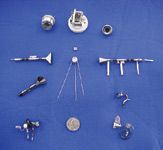
eLD LC–MS system
The Hitachi NanoFrontier is the first commercial LCMS system that combines the separation of NanoLC with the high sensitivity of a linear ion trap and the high performance of a time-of-flight mass analyzer, which reportedly allows for operation in LIT mode for MSn (CID and ECD) or Q-TOF mode for MS-MS. According to the company, the product provides high performance (resolution, dynamic range) and tools for the analysis and data processing of small and large bio-molecules. Hitachi High Technologies America, San Jose, CA;
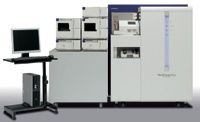
Microplates
MicroLiter's black 96-well microplates are designed for samples that are light sensitive. The 1.3-mL round-well microplates feature a conical bottom. The plates are supplied with a black pierceable EVA cover. According to the company, microplates are available with amber, round, or conical inserts for samples that are not compatible with polypropylene. MicroLiter Analytical Supplies, Inc., Suwanee, GA.
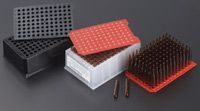
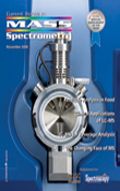
LIBS Illuminates the Hidden Health Risks of Indoor Welding and Soldering
April 23rd 2025A new dual-spectroscopy approach reveals real-time pollution threats in indoor workspaces. Chinese researchers have pioneered the use of laser-induced breakdown spectroscopy (LIBS) and aerosol mass spectrometry to uncover and monitor harmful heavy metal and dust emissions from soldering and welding in real-time. These complementary tools offer a fast, accurate means to evaluate air quality threats in industrial and indoor environments—where people spend most of their time.
NIR Spectroscopy Explored as Sustainable Approach to Detecting Bovine Mastitis
April 23rd 2025A new study published in Applied Food Research demonstrates that near-infrared spectroscopy (NIRS) can effectively detect subclinical bovine mastitis in milk, offering a fast, non-invasive method to guide targeted antibiotic treatment and support sustainable dairy practices.
Smarter Sensors, Cleaner Earth Using AI and IoT for Pollution Monitoring
April 22nd 2025A global research team has detailed how smart sensors, artificial intelligence (AI), machine learning, and Internet of Things (IoT) technologies are transforming the detection and management of environmental pollutants. Their comprehensive review highlights how spectroscopy and sensor networks are now key tools in real-time pollution tracking.